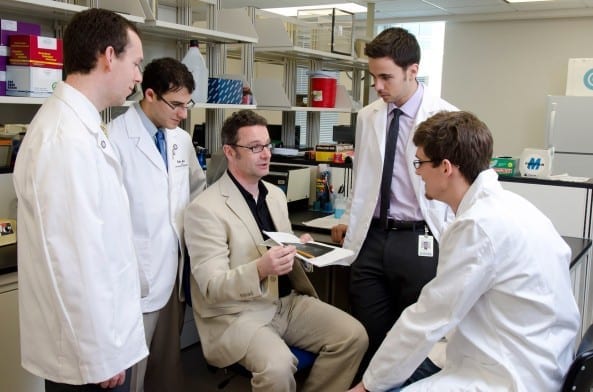DMU has a new student organization that’s also a feather in the University’s cap: The Genetics Student Interest Group of Des Moines University recently made DMU one of only seven medical schools in the U.S., and the first and only osteopathic medical institution, to earn affiliation with the American College of Medical Genetics (ACMG).

Alisdair “Rod” Philp, Ph.D., assistant professor of biochemistry and nutrition, was inspired to help students create the group because of their anxiety over genetics questions on medical licensing examinations. He is an elected affiliated scientist of the ACMG, which enabled the student group’s affiliation. Philp says the rapid advancement in genetic knowledge and research, along with DMU students’ interest in both, affirmed the idea for such a group.
“The human genome project took years, around 20 world-class institutions and 2.7 billion dollars,” he says about the effort, completed in 2003, to identify all the thousands of genes in human DNA. “It revolutionized my job. Nowadays, you can sequence the coding part of the genome with one machine and one person in an off-the-shelf test for around $4,500 in 90 days.
“The field of genetics has changed so much in recent years. We are on the cusp of a paradigm shift in how genetics impacts clinicians, from family practice to the specialist surgeon,” Philp adds. “That’s why we need to cater for students who are interested in this area. We have the opportunity to give our students, from any of our programs, a strong advantage in a competitive field.”
It’s a field clinicians and researchers can use to enhance health care. For example, members of a family plagued by diseases such as diabetes may be able to have bettercrafted medications as scientists discover the subtle genetic changes that influence individual patients’ responses to drugs.
In addition, diseases that were always considered too complicated for genetic analysis, such as coronary artery disease, are rapidly being deciphered. Recent advances in the U.S. and Europe have seen successful gene replacement therapies, based on the accurate identification of the causative gene. And as more companies bypass the physician and diagnosis – “an alarming prospect,” Philp says – with services that genotype individuals’ DNA, health care providers will be asked to analyze and translate their patients’ results.
“Medical genetics is a rapidly expanding field and will likely be integrated into nearly every branch of medicine,” says Arman Cicic, D.O.’14, president of the genetics student interest group (SIG). “By providing comprehensive and upto- date genetics education, the SIG hopes to keep our students at the forefront of contemporary medicine and maintain DMU’s mission to produce highly competent health professionals.”
The mission of DMU’s SIG, says vice president Scott Miller, D.O.’14, is to “provide students and staff, along with local physicians and residents, with comprehensive medical genetics education to better serve and advocate for the health of our community.” In addition to providing a forum for students to research topics in medical genetics and present their findings, the group will seek to foster networking among health care providers and researchers at other universities, hospitals and more.
The group also plans to survey DMU alumni in family practice and who are physician assistants in central Iowa to learn the most common genetic diseases they encounter in their practices, what they wished they had learned in genetics and what DMU should teach students about genetics today. That information may lead to enriched curriculum for students and continuing education for practitioners.
“This is a student-driven effort to demystify genetics for students, physicians, residents and others,” Philp says. “The field changes so quickly that many practicing physicians can get left behind by uninformative technical terms. Often it appears that the new advances are very complicated, but the beauty of genetics is that it’s like Legos. It fits together one way; you just need to have someone show you how the trick works.”
The student group is also in the process of arranging genetics grand rounds that draw together oncologists, pediatricians, surgeons, family practice physicians, genetic counselors, nurses and other interested professionals from local health care institutions, a quadruple win for those participants, DMU students, faculty and patients.
“For a basic scientist, I believe it is essential for us to maintain close contact with the health care professional,” Philp says. “If we do not, we run the risk that what we teach students will be out-of-date. Furthermore, these rounds, I hope, will present the opportunity for practitioners in Des Moines to take a seat at a truly interprofessional forum.”

